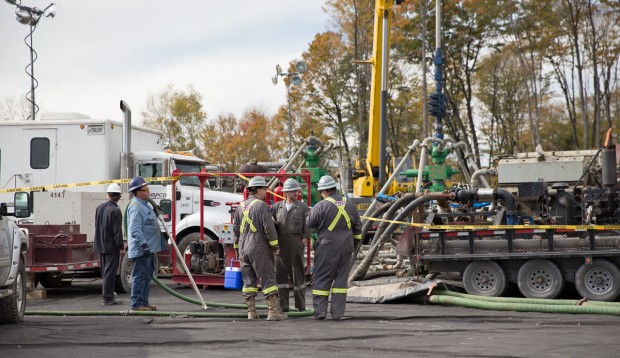What’s still at stake in the Act 13 court battle?
-
Marie Cusick

Lindsay Lazarski / WHYY
For the past two years, Act 13 has been tied up in a court case over its constitutionality.
It appears that much of Pennsylvania’s two-year-old oil and gas law, known as Act 13, will remain intact despite a continuing court battle over its constitutionality.
The Commonwealth Court issued an order this week stating the parties in the case have agreed to argue a narrow set of issues– not including Pennsylvania’s gas drilling impact fee, which has generated about $200 million annually.
The case has pitted a number of local governments against the Corbett administration. In a 4-2 decision in December, the state Supreme Court sided with the local governments and held that several provisions restricting local zoning rights were unconstitutional.
But the justices sent the case back to the lower Commonwealth Court, leaving a number of matters unresolved. These included the issue of severability– essentially whether the rest of the law can stand without the portions that where struck down.
The parties in the case have agreed only to look at severability in terms of the zoning section of Act 13, not the entirety of the law.
Representatives of both sides in the case declined to comment, citing the ongoing litigation.
“There are some discrete provisions up in the air,” says Widener University environmental law professor John Dernbach. “But a lot of Act 13 is going to remain in effect, regardless of what the Commonwealth Court decides or the Supreme Court decides.”
Here are the four key issues before the Commonwealth Court:
Is the “doctor gag rule” legal? Language in Act 13 has some medical professionals concerned they could get in trouble for disclosing chemical trade secrets associated with gas drilling. The Commonwealth Court has to decide whether this is constitutional.
Can private companies use eminent domain? Part of Act 13 allows a private corporation to use the state’s eminent domain power to take private property for the storage of natural gas. The court has to decide whether this constitutes a public purpose, which would permit the taking of private property.
Is Act 13 a “special law” crafted specifically for the oil and gas industry? Act 13 requires the state Department of Environmental Protection to notify public water suppliers about pollution incidents, but not private well owners. The court is looking at whether this makes it a so-called “special law,” tailored for the oil and gas industry, which would be prohibited under the state constitution. The court is also looking at whether the “doctor gag rule” constitutes a special law.
Given that some of the zoning sections were thrown out by the state Supreme Court, to what extent do other sections remain meaningful? Can they stay or should they go? The court is looking specifically at several sections which give the state Public Utility Commission the authority to review local zoning ordinances and withhold impact fee money to municipalities. The question now is whether these sections remain viable, given that the other zoning sections were tossed out.
This article has been updated to reflect the following correction: One of the sections of Act 13 at issue in the case for potentially being a “special law” compels the state Department of Environmental Protection (not drillers) to notify public water facilities of pollution incidents.
















